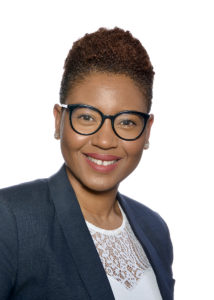The Power of a “Yes” or “No”
A look at the career journey of a Black actuary in Canada
February 2022Photo: iStock.com/Peopleimages

It took me years before I became comfortable saying “no.” As a people pleaser and a person who enjoys helping others, I often felt bad responding negatively to requests. I desperately wanted to be a superhero, but I realized it was unrealistic.
As a result, I became good at determining when a “yes” was worthwhile and when I could comfortably refuse. While saying “no” helps me keep my sanity today, I would not be the actuary I am without the many “yes” responses that shaped my career and character.
From “No” to “Yes”
Surprisingly, I initially said “no” to my career calling. I was too afraid to fail in my pursuit of becoming an actuary. My heart said “yes” to mathematics, while my head said “no” to the risk. I was not brave enough to pursue it, I had never met a Black actuary and my close family had never heard of any either. It felt way too risky, so I followed my rational self and pursued an economics degree instead.
In 2003, right after my graduation from university, I handed my mom my degree—it was hers. Growing up, I knew how important it was for my sister and me to obtain our university degrees and subsequently earn a decent living. Our parents had immigrated from Haiti as teenagers with nothing but their suitcases. They met in Montreal, got married and had us. All we were asked to do—in addition to being good human beings—was to complete our education.
At that moment right after graduation, I said “yes” to my heart when it asked to pursue my dream of becoming an actuary. Now that I had a university degree in hand, I felt I had mitigated the risk and had a backup plan in case things went south in my new endeavor.
Growing and Learning Experiences
My first attempt to complete an actuarial science program was a disaster. I put a lot of pressure on myself, my confidence level was low, and I was convinced that I could not do it because I was three years older than everybody else in the program. For a couple of months, my then-part-time job in the banking industry became a full-time role. But I still felt the call from the actuarial profession, so in 2004 I returned to school on a full-time basis, determined to earn my mathematics degree with a specialization in actuarial science. This time, I wanted a happy ending to the story of my actuarial journey.
A year later, having successfully passed two actuarial exams, I said “yes” to my first actuarial internship as a retirement plan administrator at a consulting firm in Montreal. It was my first work experience in the actuarial field. That summer, I discovered the power of Excel. I worked on benefit calculations, divorce settlements and special projects. While my tasks were not thoroughly actuarial, I gained foundational knowledge that later became useful.
In 2008, after more than a year working full time as part of the team where I completed my first internship, I said “yes” to a job offer in pension consulting in Philadelphia. For the first time in my life, I lived in a city where I knew no one, where I could only use my second language and where the pension laws were different from the ones I knew. I had Black colleagues who were not actuaries, and they expressed their pride in my pursuit of this career. Some of them brought their kids to the office to meet me.
My actuarial colleagues became my family in Philadelphia, and I celebrated their milestones, such as obtaining actuarial designations. I admired their accomplishments and tried to visualize myself doing the same. Meeting Black credentialed actuaries for the first time at the International Association of Black Actuaries (IABA) annual meeting completely shifted my mindset. I gained confidence and finally was convinced that my goal was not unrealistic. Saying “yes” to my non-Black colleague who invited me to present with him at the IABA event was one of the best decisions I ever made.
In 2011, when I transferred back to Montreal, I was determined to become a fellow. I said “yes” to my coworkers when they invited me to study with them for the advanced exams at the office early on Saturday mornings and weekdays. We put in the required time and effort, navigated through the failures along the way and encouraged ourselves until we reached the finish line.
In 2014, I attended the Vancouver Fellowship Admission Course and invited my mother to join me at the celebratory banquet. I certainly said “yes” when I heard my name, quickly walked to the stage, received my fellowship diploma and took a picture with the then-president of the Society of Actuaries (SOA). It was surreal to me, looking around the room. There were fewer than five Black people in attendance. I was proud of my accomplishment because I knew that one day, here in Canada, I could be to others what the actuaries I met at the IABA event in Philadelphia were to me.
Becoming a Leader
During the following years, I accepted several new challenges and grew from getting out of my comfort zone. I was offered opportunities that resulted in job and industry changes, becoming an exam volunteer for the SOA, earning a degree in innovation management, completing an 18-month secondment assignment at a client, and becoming an operations and people leader. My path brought me to meetings with key executives, and I was able to use my voice at the table and bring a diverse viewpoint.
Fast-forward to today, and diversity, equity and inclusion (DE&I) is at the forefront of many discussions. For the first time in my life, I regularly speak about my journey as a Black actuary in Montreal.
Sharing my story is not enough, and I am glad I said “yes” to an old colleague who asked me to become the leader of the Montreal affiliate of IABA. With this role and my position on the board of directors of the Actuarial Foundation of Canada, I hope to inspire and help shape a diverse next generation of actuaries in Canada.
Statements of fact and opinions expressed herein are those of the individual authors and are not necessarily those of the Society of Actuaries or the respective authors’ employers.
Copyright © 2022 by the Society of Actuaries, Chicago, Illinois.

